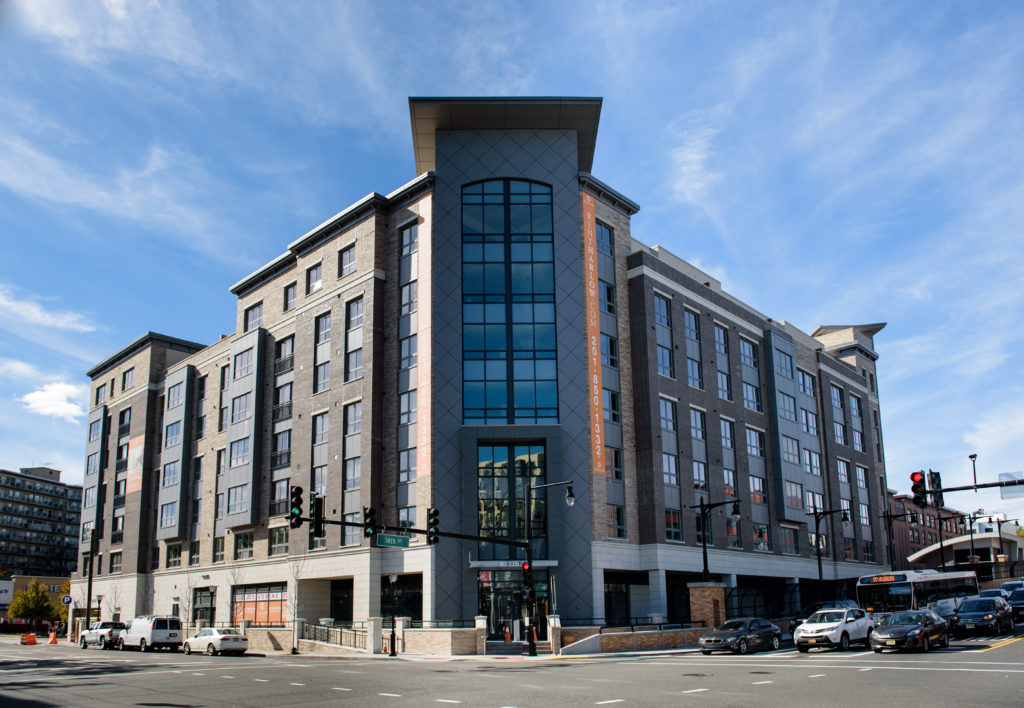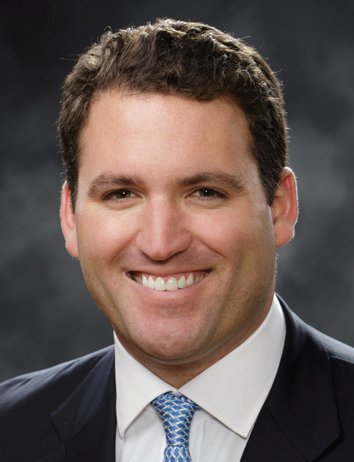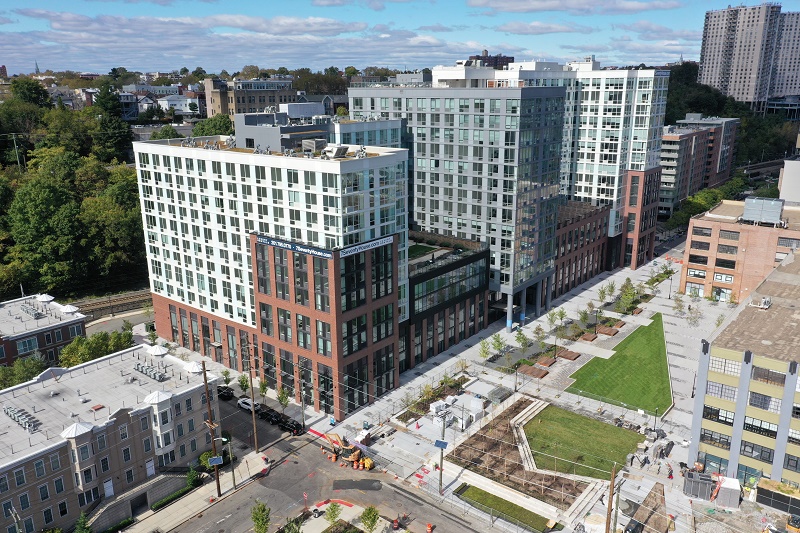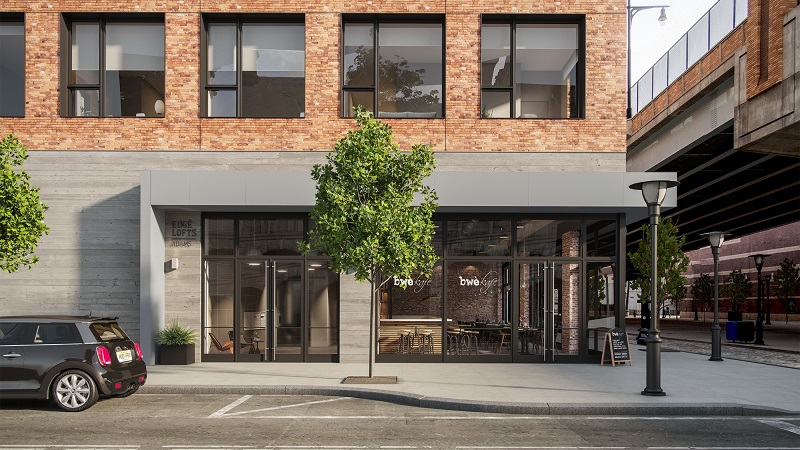Edge Adams, a 34-unit apartment building at 1405 Adams St. in Hoboken, is home to a new location for the local coffee chain bwe Kafé. Developer Bijou Properties has sought to expand services in the city’s North End while attracting retailers that will drive new foot traffic. — Courtesy: Bijou Properties
By Marlaina Cockcroft
It may be the Mile Square City, but Hoboken still has room to grow. After creating mixed-use projects in the largely industrial western half, developers are focusing on the city’s northwestern corner, known as the North End.
City officials are in favor of the growth, with a North End Redevelopment Plan in progress that focuses on a diversified tax base, open space and flood-resistant infrastructure.

“One of the things that I wanted to see when I got elected was responsible development in our industrial northwest,” said City Councilmember Philip Cohen, who took office earlier this year.
Cohen, who serves on the North End Redevelopment Committee, said design firm WRT will be unveiling a plan in October for the roughly 30-acre zone, which is bounded by 14th Street to the south, Union City to the west, Weehawken to the north and Park Avenue to the east. He added that development needs to be sensitive to the fact that Hoboken is a community, a concern that’s not lost on commercial real estate firms in the area. Bijou Properties, which owns parcels within the redevelopment zone, has built hundreds of residential units in the city’s northern and western sections and has a history of growing neighborhoods around its projects, with a focus on creating multifamily buildings supported by commercial and retail tenants.
“You have to create something on a large scale,” said Chris Mazzola, the firm’s director of development. “This is not development that happens incrementally.”

Much of the North End was underutilized or vacant, and didn’t attract much foot traffic. Dave Gaber, partner and chief financial officer at Hoboken-based Bijou, said the firm has started to change that by bringing a mix of commercial tenants to its 40,000-square-foot building on 15th Street, including Orale Mexican Kitchen and the Gravity Vault rock climbing gym.
“Because we own so many properties around Hoboken, when we look at a new site, it’s not just about what’s best for this site, it’s what’s best for the surrounding neighborhood,” Gaber said.
Advance Realty is also looking to build in the North End. Its Grand & Adams project at 1417 Adams St., between 14th and 15th streets, is “an exciting project, it fits the neighborhood,” said Dan Cocoziello, principal and managing director of development at Advance. Plans include a six-story building with 58 luxury apartments, 13,000 square feet of retail and office space and a parking garage.
The project recently got approval from the city zoning board, but the zoning board attorney is appealing a judge’s ruling to grant the variances for the project to proceed, Cocoziello said.
“We’re hopeful that we can move forward very soon,” he said.
Advance next plans to redevelop its site at 1404 Willow Ave., currently housing a Hertz car rental agency. Cocoziello called the site a “gateway into Hoboken” via the viaduct and the bridge to Weehawken. An application is in the works, he said.

For that site, the firm plans something similar to the Harlow, Advance’s project at 1330 Willow Ave. The 140-unit building with ground-floor retail, including a Trader Joe’s, features studio to three-bedroom apartments with a concierge, pool, parking, PATH shuttle and fitness center, with rents ranging from $2,600 to $5,500.
When the Harlow opened in 2016, replacing a gas station, “it really changed the dynamic of that neighborhood,” Cocoziello said.

“When you look at linking the waterfront to other parts of town, I think that was an area where you cross over Willow (Avenue), that traditionally there wasn’t a lot of activity,” he said. The Harlow made the area walkable, “not only for families, but for people who were living in the back part of town who could walk late at night under the viaduct and get to the waterfront.”
Bijou has long been a key player in connecting neighborhoods within Hoboken. Mazzola pointed to the North End location of bwe Kafé, in the firm’s 34-unit Edge Adams building next to the 14th Street Viaduct. The area around the viaduct park didn’t have coffee, so Bijou offered a space to the Hoboken-based chain.
Mazzola said the key is to find retailers that people want to visit every day. Those tenants aren’t national, “they don’t have the strongest balance sheet and we need to subsidize them in a way that makes them comfortable that they can set up a location that works.”
“We want to give people the ability to spend a half-day, a day, in the North End,” he said.
Cohen, previously a zoning board commissioner, said another key factor in new development is benefits or public spaces for the community. The three-block Western Edge project currently in development from Pegasus Partners, for instance, will include plaza space and a community pool along with a proposed 357 residential units and a 281-room hotel.
The two-building project, which is just south of the 14th Street viaduct between Madison and Jefferson streets, is part of a larger redevelopment plan in the area. Last month, Pegasus also secured city council approval for a plan that would bring 701 units, 526 parking spaces and 40,000 square feet of public open space to the site of the Universal Box Co. on Madison Street, between 12th and 14th streets, according to The Jersey Journal.
Another factor, Cohen said, is resiliency and green infrastructure, citing the resiliency park the city is building in an area devastated by Hurricane Sandy.

Mazzola agreed: “We need to be part of the solution with regard to continued storm resiliency, not part of the problem.” Bijou’s buildings include green roofs to absorb water without overpowering the sewer system, as well as an underground stormwater detention system that can hold rainwater until the sewer system is clear.
Cocoziello said flood mitigation is part of Advance’s planning, including pumps and detention basins.
A further concern for residents, Cohen said, is congestion and traffic flow, and one potential giveback to the community may be a new light rail station.
Rents on the west side and the North End are comparable to the waterfront, the developers say, because of the amenities they’re offering and the neighborhood feel. Mazzola said buildings along the waterfront, including Jersey City and Weehawken, are losing tenants, while “we’re seeing up to five new leases a week.”
“People come to Hoboken because they want to live here, because they want the walkable village neighborhood experience.”

As proof, Mazzola cites Bijou’s 7 Seventy House project on the west side, which opened last fall at 770 Jackson St. The building offers a rooftop pool deck, fitness studio, kids’ playroom, co-working lounge, concierge service, PATH shuttle, Manhattan views, ground-floor retail, playground and public gym, with rents ranging from $2,800 for a one-bedroom to $6,400 for a three-bedroom unit. The building is over 80 percent leased, he said.
Creating 7 Seventy took multiple community meetings and discussions with stakeholders. Residents objected at first, but Bijou revised the concept to win their approval.
“The success was the amount of area that we were able to assemble, because without the park, and the playground, and the plaza and the gymnasium that we built, we wouldn’t have had the ability to build a neighborhood,” Mazzola said, referring to the project’s additional community spaces.
Gaber said the amenity space and 12,000-square-foot lobby have been appreciated during the pandemic, since “people can really feel safe going in and out of the building and still be able to social distance.”
Post-pandemic, Cocoziello said, there will be a desire for midrise buildings with culture and community. People are leaving high-rises in Manhattan and Jersey City to come to Hoboken, he said.
Cohen cautioned, going forward, that too much density or height doesn’t fit well with the city, and developers’ focus needs to be on livability, community, resiliency and design.
The developers, though, said some density is necessary. Mazzola said they can build higher now than when the city was first formed 100 years ago, and taller buildings allow them to leave open space. “You need to accept height” in order to include the amenities, as Bijou did with 7 Seventy House and plans to do in the North End.
Cocoziello said, “Density’s important to support local businesses, to support eventually having an office component and supporting a daytime population.”
The pandemic has slowed down the planning process, but Cohen said the city will continue to move forward: “Hoboken is a very desirable place, and we want it to remain so.”










